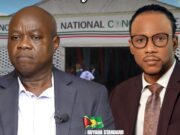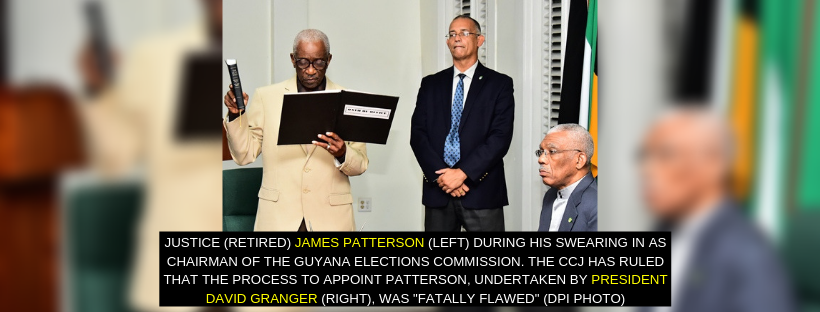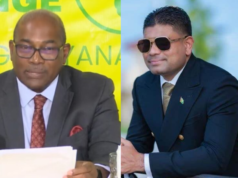The Caribbean Court of Justice (CCJ) today ruled that the appointment of Guyana Elections Commission (GECOM) Chairman, Justice (Ret’d) James Patterson, was flawed and in breach of Article 161 (2) of the Constitution of Guyana.
The ruling was handed down this morning by CCJ President, Justice Adrian Saunders, who indicated that the majority opinion of the court was that the process was flawed and in breach of Article 161 (2) of the Constitution of Guyana since it was done using criteria not sanctioned by the Constitution and since President David Granger failed to provide reasons for why the provided list of candidates for the GECOM chairmanship was rejected.
When the matter commenced this morning, Justice Saunders summarised the case, including the decision of President David Granger and what led to the eventual appointment of Patterson. It was noted that the propriety of the Chairman’s appointment could be inquired into and that the Court had jurisdiction to settle what the Constitution meant and whether any actions taken by a constitutional officer were outside of the constitution.
According to Justice Saunders, the evolution of the Constitution regarding the appointment of GECOM’s Chairman had been characterised by a shift from exclusivity and unilateral power within the President to the inclusion of the Leader of the Opposition in the process. He noted that the Opposition Leader was required to provide a list of six persons who satisfied the eligibility criteria and, from the list, the President must choose a person who is acceptable to him.
According to Article 161 (2), “…the Chairman of the Elections Commission for Guyana shall be a person who holds or who has held office as a judge of a court having unlimited jurisdiction in civil and criminal matters in some part of the Commonwealth or a court having jurisdiction in appeals from any such court or who is qualified to be appointed as any such judge, or any fit and proper person, to be appointed by the President from a list of six persons, not unacceptable to the President, submitted by the Leader of the Opposition after meaningful consultation with the non-governmental political parties represented in the National Assembly.”
Justice Saunders, who presented a summary of the five-panel judges’ opinions, said that it was not clear what “meaningful consultation” meant and what the process was to follow to accommodate the spirit of consensus between the President and the Leader of the Opposition. He said that the most sensible approach would have been for the two parties to communicate with each other in good faith and perhaps even meet to discuss eligible candidates before the list is submitted. This approach, he said, would ensure that all candidates fitted the eligibility criteria, thereby removing the possibility of them being unacceptable to the president.
Justice Saunders further said that the court is of the view that the employment of the double negative “not unacceptable” places the onus on President Granger to not find a candidate unacceptable simply because that person was not his own suggestion. Justice Saunders said that the determination of non-eligibility of a candidate should be done on good reasons and not capriciously since this would defeat the amendments of Article 161 (2) of the Constitution and paves the way for a unilateral appointment of GECOM’s Chairman.
Furthermore, Justice Saunders indicated that the court analysed what transpired between the period of November 22, 2016 and November 19, 2017 and it was noted that the president was not allowed to lay down eligibility criteria that were not provided for in the constitution. Nonetheless, he said, there was no suggestion that the president did not act in good faith. However, Justice Saunders indicated that the majority opinion of the court was that the process was flawed and in breach of the constitution, on the grounds that it followed non-specified criteria. The process was also flawed, the court ruled, since President Granger failed to provide reasons for why the provided list was rejected.
The court has invited the parties to make submissions on the consequential orders and has adjourned until June 24, 2019 at 2:00 PM Eastern Caribbean Time.
The panel of five judges included, along with Justice Saunders, Justices Winston Anderson, Jacob Witt, David Hayton, and Maureen Ragnauth–Lee.













